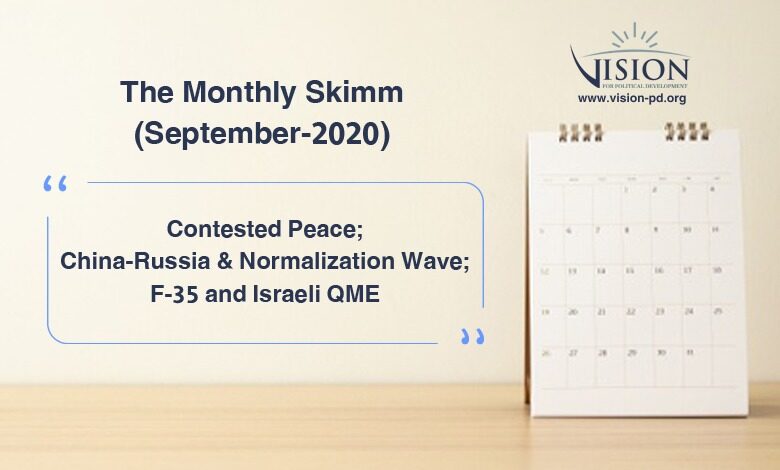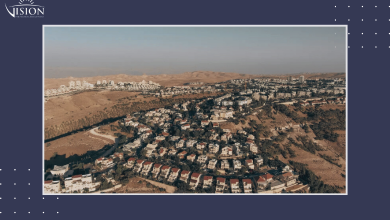The Monthly Skim (September): Contested Peace; China-Russia & Normalization Wave; F-35 and Israeli QME

Prepared by: Mohamed Dar-khalel
UAE-Bahrain Normalization Is Not An Earthquake
When Egypt had normalized its relations with Israel, it was considered seismic. She maximized its ties with the USA to the detriment of its previously strong relations with the Soviet Union. Egypt was additionally considered a regional power, and the change influenced the region like a nuclear bomb. However, Emirati step (Kaye, 2020) does not rise to the level of a political earthquake that transforms regional and global realignments. Furthermore, it does not serve as an alternative to regional divide between Arabs and their leaders.
What about the nature of strengthening the Emirati’s ties with Israel? The calculations of the Abraham Accords Peace Agreement’s (AAPA) benefits should be made with equal consideration for the risks. Obviously, the UAE put a premium on utility. And if the new ties (Kaye, 2020) reinforced the longstanding negative regional characteristics fueling the unaccountable leadership, the outcomes would be in contradiction with American and Israeli exuberance.
Is Israel replacing the USA as a security partner to Gulf States?
Yes, the US is retreating from the Middle East. Trump has not initiated the first step, but he has accelerated it (Wright, 2020). American achievement around the world has dramatically declined (Dobbins, 2020). The decline started during the George W. Bush presidency and has become more precipitous under Trump’s presidency. This becomes evident when comparing the last two decades with the post WWII period. Every four years witnessed a decline in the achievement, which resulted in a “lost generation” in US foreign policy.
When Saudi Aramco was pummeled by Iranian cruise missiles in 2019, Saudi leaders received excuses from the Trump administration. This event increased concern for Saudi leaders who rely on US security to protect against confrontation with the Islamic republic. This is what made Israel more attractive to the Gulf States (Ottaway, 2020). And this can be seen as one clarifications of the controversial normalization with Israel.
Yet, America’s retreat from the region does not mean she is not sought by Arab states, and Israel is considered a connective tissue to the White House (Wright, 2020) Sadat’s peace initiative with Israel was more about making peace with Washington. Accordingly, what is called a “peace process” between Gulf States and Israel is to the strategic benefit of the White House such that the UAE is offering to empower its ties with the Whitehouse; First, the benefit of cultivating the Arab autocrats as constant cash buyers for the United States; Second, getting Iran besieged into a corner; Third, it contributes toward ending American military deployment in the region; Fourth, it paves the way for the American vision for the Israeli-Palestinian conflict’s outcome.
The UAE could enhance its ties with both republicans and democrats in the US via its normalization process with Israel, but they ignored the fact that the region is moving towards a post-American era (Makovsky, 2020). It would be a mistake for any American administration to invest into this type of normalization, which is built on a transactional basis, and can threaten the real normalization in the future.
Bypassing Strategy
The Israeli Prime Minister Benjamin Netanyahu has adopted a bypassing strategy (Yaari, 2020) that breaks the Palestinian veto restricting formal relations between Israel and Arab States. And having achieved normalization with the UAE and Bahrain, this is likely to break the barriers that restricted relations with other Arab states (e.g., Saudia Arabia, Oman, Kuwait, Sudan, Qatar, etc.) (Heistein, 2020). Netanyahu is exploiting the complicated circumstances surrounding the Arab states on one hand (Ross, 2020), and the decline of the Palestinian cause among the Arab states on the other hand.
However, his strategy of bypassing the Palestinians to achieve regional peace is not possible without a territorial component for the Palestinians. This means the key element in any regional peace process depends on the Palestinians (Wright, 2020). Accordingly, American policies must consider two core elements; these involve one of “leaning towards Israel for security and one of leaning towards Palestinians for matters relating to territory and governance”.
The Abraham Accords is contributing to the redistribution of power among Arab States (Makovsky, 2020), the centrality of Egypt in particular. The UAE normalization with Israel is meant to include consequences beyond Israeli-Emirati relations, for Gulf countries, East Mediterranean and even South Asia (Makovsky, 2020). Apart, Kosovo and Serbia would normalize their economic ties (Stradner, 2020). The agreement is considered born of Trump’s vision on the “solution” for the Palestinian-Israeli conflict, which includes Kosovan recognition of Israel, and moving the Serbian embassy to Jerusalem.
Saudi autocrats (Alterman, 2020) desire comprehensive normalization with Israel, but the context is complicated and the way forward is arduous. The Saudi family has had a unique relationship with the clerical establishment for centuries and abandoning the Palestinians can increase critics. Additionally, Saudi’s religious position can curb the Saudi’s desire to do so.
F-35 & the Israeli QME Concerns
Israel has maintained its military superiority in the Middle East (McVann, 2020), but the UAE’s purchase of F-35s have been widely perceived as a threat to Israeli domination. However, selling the F-35 to Abu Dhabi does not mean the Americans are offering its highest production of the F-35’s system; instead, it would provide jets with less-capable weapons and sensors. Additionally, the United States could limit the purchase number to the UAE and offer Israel the system to preserve its QME.
Russia’s Careful Approach (BORSHCHEVSKAYA, 2020):
Moscow has long adopted a balanced policy towards a comprehensive Middle East settlement, which recognizes that peace cannot be achieved without the Palestinians. This explains its caution towards the Abraham Accords and the bypassing of Palestinian negotiation. Furthermore, Russia is careful because the normalization seeks to siege and restrict Iran, which can threaten future peace in the region.
What about Beijing (Ramani, 2020)?
China has adopted an approach which has been regarded as a balanced and vagueness regarding the Middle East conflict. This allows China to be less at variance with nation states in the region which benefits its economic agenda. Regarding the Abraham Accords, China shares its concerns prudently raising awareness that the agreement may fuel radicalization and polarization in the region. Granting that, she finds the Accords beneficial as it promotes the balance of power in Mediterranean Sea as turkey, in China’s eyes, has been a destabilizing agent regarding its conduct in Libya.
UAE-Israel Normalization Targeting Turkey As Well
Iran is not the only target of the agreement between the UAE and Israel, Turkey falls in the crosshairs as well (Barkey, 2020). Both countries share common concerns about Turkey under the leadership of Erdogan, who supports the Muslim Brotherhood and allows Hamas’s leaders to work on Turkish lands providing them with cover. Furthermore, the contradictions on the regional issues are obvious considering the siege of Qatar, Mideast and the building of Turkish military bases in Libya, Somalia and Sudan.
- MonthlySkimm is a narrative brief of the political opinions and analysis conducted by considerable think tanks about the Palestinian-Israel conflict.
Bibliography
Alterman, J. B. (2020, Sep 15). The Significance of the Israel-UAE Deal. Retrieved from The Center for Strategic and International Studies: https://www.csis.org/analysis/significance-israel-uae-deal
Barkey, H. J. (2020, Sep 14). UAE-Israel Agreement Isn’t Only About Iran. There’s Also Turkey. Retrieved from MIDDLE EAST INSTITUTE: https://mei.nus.edu.sg/think_in/uae-israel-agreement-isnt-only-about-iran-theres-also-turkey/
BORSHCHEVSKAYA, A. (2020, Sep 15). Why Moscow is quiet on the Israel-UAE peace deal. Retrieved from THE HILL: https://thehill.com/opinion/international/516492-why-moscow-is-quiet-on-the-israel-uae-peace-deal
Dobbins, J. (2020, Sep 15). The Lost Generation in American Foreign Policy. Retrieved from RAND Corporation: https://www.rand.org/blog/2020/09/the-lost-generation-in-american-foreign-policy.html
Heistein, A. (2020, Sep 16). Is the Israel-UAE agreement a game changer for Israel? Retrieved from Middle East Institute: https://www.mei.edu/publications/israel-uae-agreement-game-changer-israel
Kaye, D. D. (2020, Aug 17). Why Israel-UAE deal doesn’t merit the hype. Retrieved from AL-MONITOR: https://www.al-monitor.com/pulse/originals/2020/08/israel-uae-agreement-earthquake-egypt-bahrain-oman.html
Makovsky, D. (2020, Sep 14). The UAE-Israel Breakthrough: Bilateral and Regional Implications and U.S. Policy. Retrieved from The Washington Institute: https://www.washingtoninstitute.org/policy-analysis/view/the-uae-israel-breakthrough-bilateral-and-regional-implications-and-u.s.-po
McVann, C. (2020, Sep 23). How to Balance Competing Priorities with an F-35 Sale to the UAE. Retrieved from The Washington Institute for Near East Policy: https://www.washingtoninstitute.org/policy-analysis/view/how-to-balance-competing-priorities-with-an-f-35-sale-to-the-uae
Ottaway, D. (2020, Sep 15). Will New Diplomatic Openings Lead to Israeli Military Aid to the Gulf Arab States? . Retrieved from Wilson Center: https://www.wilsoncenter.org/article/will-new-diplomatic-openings-lead-israeli-military-aid-gulf-arab-states
Ramani, S. (2020, Aug 27). Russian and Chinese views on the Israel-UAE normalization deal. Retrieved from Middle East Institute: https://www.mei.edu/publications/russian-and-chinese-views-israel-uae-normalization-deal
Ross, D. (2020, Sep 14). The Middle East is changing. Will Palestinians be left behind? Retrieved from The Washington Post: https://www.washingtonpost.com/opinions/2020/09/13/middle-east-is-changing-will-palestinians-be-left-behind/
Stradner, I. (2020, Sep 15). The US-led Kosovo dialogue is a step in the right direction. Retrieved from American Enterprise Institute: https://www.aei.org/op-eds/the-us-led-kosovo-dialogue-is-a-step-in-the-right-direction/
Wright, R. (2020, Sep 23). Whither the Middle East: New Peace or More Conflict? Retrieved from Wilson Center: https://www.wilsoncenter.org/article/whither-middle-east-new-peace-or-more-conflict
Yaari, E. (2020, Sep 10). The Road Beyond UAE-Israel Normalization. Retrieved from The Washington Institute for Near East Policy: https://www.washingtoninstitute.org/policy-analysis/view/the-road-beyond-uae-israel-normalization





